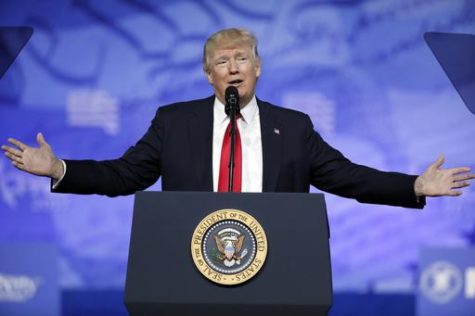World Reacts to Trump Immigration Ban
March 24, 2017
Protesters and world leaders lifted their voices over the actions of one man.
Trump signed Executive Order 13769 on January 27th, 2017, but most of the effects of the ban were blocked in court by February 3rd. All seven of the targeted countries have refuted Trump’s actions regarding their countries, and individuals are protesting in cities such as Paris, France, London, England, and Sydney, Australia. Individual protests against the order focus on condemning nativism and racism, and politicians in the U.S. and international community have both praised and condemned the order.

The primary method opponents of the ban have used to take action is protest, illustrated by the millions who took to the street to allow seven countries: Iraq, Iran, Syria, Yemen, Sudan, Somalia, and Libya to be welcome to the United States. Protesters believe the ban is a Muslim ban, as Trump has a history of proclaiming radical Islam to be a major threat and has used many graphic words to describe Muslims in the past.
The countries also included in the ban are Majority-Muslim, but a statistic showed that only 7% of terrorist attacks in the US have been executed by Muslims. All seven of the countries in the ban have made statements regarding their citizens and leadership as a country.
Following the failure of the executive order in court, Trump signed a new Executive Order “Protecting The Nation From Foreign Terrorist Entry Into The United States” on March 6, 2017.
The new revised ban focuses on excluding Iraq from the group of blacklisted countries, but continues to block entry from US citizens of Somalia, Sudan, Syria, Iran, Libya, and Yemen.
It also clarified that people of these countries that have received US green cards will not be affected. White House officials told The Washington Post that the duration of the ban stays the same as the original, 90 days. The new order comes in response to the unanimous blocking of the order by the U.S. court of appeals for the 9th circuit.
The new order was also put on hold following a court ruling. Hawaii’s U.S. District Court Judge Derrick Watson put a nationwide stay on the executive order. Half a dozen other states including Maryland and Washington put forth lawsuits challenging the order, according to Time magazine.
World leaders have blasted President Donald Trump’s temporary ban on citizens from (now) six Muslim-majority countries as decisive, illegal, insulting, and discriminatory, according to CNN. Choosing a few of all the countries that spoke out, including the United States allies like Great Britain, France, Germany, and Turkey. Also found on this CNN article are all of the statements from each of the countries. For example, French Foreign Minister Jean-Marc Ayrault said that welcoming refugees was “a duty of solidarity.” He also took to the issue on Twitter saying, “Terrorism doesn’t have a nationality; discrimination is not the answer.”


